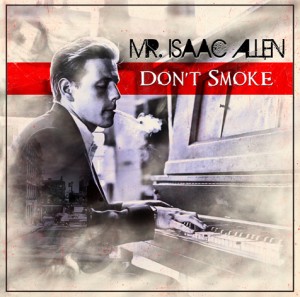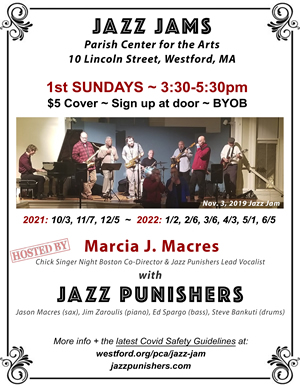 Mr. Isaac Allen sounds a lot older than his 24 years on his new Don’t Smoke CD. And his new CD is smoking’. It is also sizzling, featuring 11 tracks about life on the mean streets of life. Each song is doused with Allen’s smoky piano bar melodies and direct, gruff vocal deliver, like a young version of Tom Waits, only with more incisive guitar lines than Waits and his music closer to straight forward piano rock ballads.
Mr. Isaac Allen sounds a lot older than his 24 years on his new Don’t Smoke CD. And his new CD is smoking’. It is also sizzling, featuring 11 tracks about life on the mean streets of life. Each song is doused with Allen’s smoky piano bar melodies and direct, gruff vocal deliver, like a young version of Tom Waits, only with more incisive guitar lines than Waits and his music closer to straight forward piano rock ballads.
“The Devil” opens the disc with Allen’s mellow croon accompanied by breezy horns and a smoldering guitar phrase burning up in the background. The song is more of an ode to the power of the dark side than a warning against it. Allen clearly respects the “devil” and that general lure toward things that can make you a frantic, lonesome, down in the dumps person after you do your dance with the unholy.”
A solid beat moves “Get Right” forward in a takes its time kind of way. The jazzy lounge feeling here gives Allen plenty of room to smack down on his serious piano notes with a solemn purpose. Singing in a steady, gruff plaintive manner makes you feel as if Allen is giving you a serious talking to you over a few drinks. The sax smoldering slowly in the background underscores the forlorn sense of hopelessness that Allen seems to whispering about to his drinking guest. Amidst this darkness though, you appreciate the sense of art Allen used to create it, like an Edgar Allen Poe short story or a painting by Van Goah, a vehicle that drives into the gates of personal hell only to return with more profound knowledge of reality by having been there.
Check out too Allen’s song craft in each of these numbers. “The Mouse In My Head” has a guitar line dancing around a swirl of organ chords that in turn moves around a playful horn section. Uptempo piano is reminiscent of 1940s jazz, and Allen paces his vocal with clever twists and turns. Guest vocalist Sara-Joy Liebig adds her own spiraling vocal melody that adds the tension you feel when a police siren is closing in on you.
“Daddy’s On Death Row” is a deep peer into the heart of a ten year old boy who knows his father is going to face the electric chair. Allen manages to be solemn here without getting bogged down in the darkness. His rough low tenor voice is perfect for this deadpan ballad about the boy’s worst nightmares playing out in his imagination. Allen also writes music that can perfectly capture the scene. The blistering guitar phrase from Chris Bickley and the sultry backing vocal from Gwen Henderson create a feeling of doom, making you picture the executed murderer’s soul plunging into the fiery pits of hell. Matt Wilson’s propulsive drum playing is like the executioner forcing you to watch as he pulls the switch.
“Whalley Avenue is a delightful mix of bopping rhythm section and bari sax intrusion, a horn that keeps shuffling in. You can almost picture a 1920s speakeasy with the jazz piano bar melody. On top of it all, Allen’s swaggering, seasoned voice juts out like a precipice with its insightful words.
“Forget Where You Are” is a modern twist for Allen, synthesized percussion and electronic stomp underneath Allen’s majestically cascading piano mash ups.
An old time soft shoe shuffle with trumpet, “Bernie Madoff” gets its edge from some dobra picking from Stacy Phillips. Sara-Joy Liebig, again, adds pleasant texture to the vocal melody. Yet, it remains Allen’s voice that keeps his song truly his own.
Allen can also make fresh an old trick like combing upbeat music with downtrodden lyrics. “Meet You At The Pawnshop” is a musically chirpy but lyrically sad reflection of a couple who are selling off many of their old belongings after their relationship has ended. Allen is a clever songwriter, his sprightly piano melody belies the sad melodrama in a way that actually reinforces it.
“Misery” is more rocking than anything else on this disc. Yet, Allen manages to contain his identity as a piano bar lounge singer crooning sad tales of hard living, showing enormous compositional skill as he puts his personal balladeer stamp on even edgy rockers.
Allen did bang up job scoring his tune “Saddle.” Mandolin picking and piano tinkling resonate with power, even within their minimalism. Allen is more composer than songwriter in that he uses his piano and other instrumentation to create a large moving pastiche of sound. In many ways, his music is affecting like a stage musical or film score, stretching out the mood and feel of each number, with many dynamic tensions to underscore a myriad of emotionalism in each person he sings about. The people in his songs are closer to characters than just personalities.
Allen closes out with the classy “River Of Sorrow,” his easy going attitude flowing from a rough seasoned voice shows more of his Tom Waits influence, and it was wise to finish with a breezy view of the hard world while also paying homage to his musical idol.

